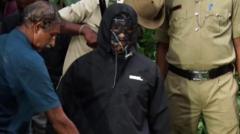Rhea Chakraborty, once embroiled in a media frenzy over the death of actor Sushant Singh Rajput, is set to gain closure as investigators concluded their case, finding no culpability on her part. This incident raises pressing concerns about the role of media in influencing public perception and justice in high-profile cases.
Rhea Chakraborty: A Media Trial's Aftermath

Rhea Chakraborty: A Media Trial's Aftermath
The tumultuous journey of Bollywood actress Rhea Chakraborty following the alleged suicide of her boyfriend Sushant Singh Rajput highlights the dangers of media sensationalism and societal judgment.
In a staggering twist to a case that captivated millions, Bollywood actress Rhea Chakraborty is now on the brink of receiving closure as India's federal investigators have determined that her late boyfriend, actor Sushant Singh Rajput, died by suicide without any involvement from her or her family. This revelation comes after a deeply polarizing media campaign in 2020 that labeled Chakraborty as a "gold digger," a murderer, and other derogatory terms, resulting in her wrongful imprisonment for 27 days.
The Central Bureau of Investigation (CBI) has informed a Mumbai court of their findings, leading Chakraborty's lawyer, Satish Maneshinde, to assert that his client underwent "untold miseries." He specifically called out the media for perpetuating a false narrative, suggesting that they should reflect on their actions to prevent a similar occurrence in the future. He stated, "Innocent people were hounded," a sentiment echoed by feminist lawyer Payal Chawla, who condemned the "misogynistic narrative" surrounding Chakraborty.
The saga began on June 14, 2020, when Rajput was discovered dead in his Mumbai apartment. Initial investigations suggested mental health struggles, a narrative that soon spiraled into accusations against Chakraborty. Following a police complaint lodged by Rajput's father, she faced insidious comments and threats from the public and media alike, with numerous allegations levied against her.
For months, as the tragedy unfolded amid a pandemic lockdown, the case became a sensational topic across Indian television networks. Several high-profile television presenters aired accusations against Chakraborty, including unfounded claims about her character. Despite her frustrating predicament, she eventually returned to her career, transitioning into motivational speaking and entrepreneurship.
Chakraborty’s voice has been muffled since news of the closure emerged; however, signs point to a family relieved by the turning tide. Her brother, Showik, who spent time in jail due to related charges, shared an uplifting post indicating a sense of justice with the saying "Satyamev Jayate," meaning "truth alone triumphs."
Contemplating her potential for legal recourse, Chakraborty faces the daunting judicial landscape of India. Critics, including columnist Namita Bhandare, have noted that pursuing a defamation lawsuit would be an arduous task, hindered by an overwhelmed legal system. The public discourse surrounding her case not only challenges the industry’s treatment of women but also emphasizes how social media can swiftly label individuals as villains in a narrative devoid of fairness.
Some media figures and political voices have since recognized the damage inflicted upon Chakraborty, criticizing the aggressive media crusade that reduced her to a spectacle. Prominent figures, including MP Sagarika Ghosh, have raised concerns in parliament about the media's role in undermining justice and the impact of sensationalism on the lives of individuals involved in such tragic events.
As the legal proceedings unfold, the question remains—will those who contributed to her vilification come forward to apologize for their actions? The Rhea Chakraborty case marks a crucial moment in addressing the chaotic intersection of media frenzy and real-world consequences.





















